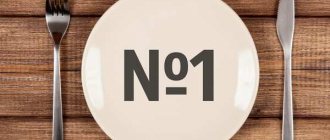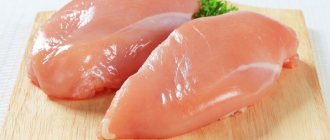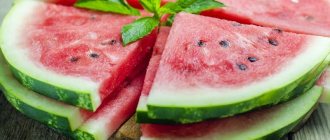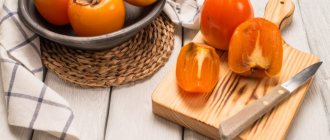Diet for gastritis and stomach ulcers: general restrictions and menu for every day
Gastritis and stomach ulcers are common diseases of the gastrointestinal tract associated with bad habits and poor diet.
The causes of both diseases are almost the same; more often, either Helicobacter or dietary errors are to blame. The diet for gastritis and stomach ulcers is approximately the same. There are also differences that are taken into account when creating an individual menu for the patient. The question rightly arises: are stomach ulcers and gastritis possible at the same time? The answer is yes, since this combination of gastrointestinal diseases occurs frequently. Gastritis, becoming chronic, subsequently leads to peptic ulcer disease. It happens that a person has a stomach ulcer, and under certain conditions (unexpected stress, consumption of alcoholic beverages or prohibited foods), ulcerative gastritis also develops. This happens due to the increased vulnerability of the epithelial tissue of the stomach.
Allergic gastritis often causes a skin disease called urticaria.
Urticaria in a patient
For peptic ulcers and gastritis, it is necessary to follow the recommendations of nutritionists regarding nutrition:
- Ensure the correct balance of protein, fat and carbohydrates to restore and maintain metabolism.
- Fractional meals, which involve frequent meals in small portions, will help the stomach efficiently digest incoming food.
- The patient should eat healthy foods, whether steamed, boiled or stewed. Fried foods will make the situation worse.
- You should not feed the patient foods that lead to increased gas formation.
- Dishes are served at the optimal temperature, not hot or cold, avoiding exacerbation of diseases.
- It is advisable to serve certain dishes in ground form.
- When preparing food, do not use large amounts of salt, which irritates the epithelium of the digestive organ, and refrain from using spices and spicy food additives.
- You can't eat right before bed, and you can't overeat.
Nutrition for gastritis and stomach ulcers must be complete and regular, providing the sick person’s body with important elements and vitamins. Usually, diet No. 1 is prescribed, which is strict, but allows you to reduce the inflammatory process and promote rapid regeneration of damage to the mucosa. Optimization of gastric secretion is achieved through a gentle food intake regimen. Diet number 1 is applicable for patients suffering from gastric ulcers and gastritis with high acidity. The products consumed are designed to reduce the negative impact of the increased content of hydrochloric acid in the digestive fluid on the inner lining of the stomach.
It will be necessary to take into account other possible diseases of the patient, for example, diabetes, when it is necessary to exclude sugar-containing products from the diet. To identify the disease, a special test is performed to help determine the elevated level of glucose in the patient’s blood.
Water for gastritis
The main source of fluid for the body is ordinary water, however, even this must be consumed by patients with gastritis, adhering to certain rules:
- Drink a moderate amount of water, preferably at the first appearance of thirst. The minimum consumed dose of fluid for the body should be at least one and a half liters per day.
- In order to reduce the load on the digestive organs, it is necessary to consume water at least half an hour before meals.
- Give preference to boiled water. Tap water may contain substances that negatively affect the stomach. Gastroenterologists also do not recommend buying or even drinking water sold in plastic bottles after boiling. This water contains bisphenol, which does not evaporate when boiled and causes stomach irritation. It is better to buy water in glass containers.
- You should not improve the taste of water by adding sugar or ingredients containing acid, which are prohibited for gastritis with high acidity and have a negative effect on the stomach.
Regardless of the level of gastric secretion, carbonated drinks are not recommended for consumption, as they provoke the progression of inflammation and accompany the occurrence of flatulence and heartburn.
Products allowed for gastritis and peptic ulcers
- It is better to eat vegetables in the form of purees, facilitating the full functioning of the stomach. Not all vegetables are allowed. For example, celery is acceptable in the diet if the patient has low acidity; the vegetable can increase the production of gastric juice. It is not recommended to use it in the acute stage. The above also applies to parsley, which has a lot of advantages in terms of the presence of a large amount of vitamins, but the culture is indicated exclusively at a low level of acidity. Parsley contains zinc, iron, magnesium, fatty acids and other important elements. Jerusalem artichoke is useful, has a beneficial effect on the mucous membranes, having a reducing effect on the production of hydrochloric acid and promoting their restoration. The vegetable helps you cope with heartburn, pain, intestinal problems and gas formation. Carrots, potatoes, pumpkin, beets, eggplants, and broccoli will provide great benefits to the body. Many of the vegetables listed are best not eaten raw. It is recommended to use dill during the treatment of the diseases in question. The seasoning copes well with pain and colic, improves appetite.
- Fruits are important due to the content of a complex of essential vitamin substances that are of great importance for the human body, especially during periods of illness. Figs are indicated for consumption for gastritis and ulcers due to their irreplaceable properties: they have an enveloping and anti-inflammatory effect on the main digestive organ. It is acceptable to eat apples, pears, quinces, bananas, strawberries, wild strawberries. Make sure that the fruits are ripe; it is better to eat selected ones without peeling. Black currant is rich in vitamins and beneficial minerals and has a positive effect on the digestive system. Raspberries are allowed to be consumed in extremely small quantities. Doctors recommend using a decoction of raspberry leaves in the treatment of gastritis and ulcers.
- It is permissible to eat white bread, only yesterday’s bread or later; buns made from soft dough, biscuits, and pita bread are allowed.
- Meat only in boiled form, especially veal or rabbit. Beef is okay, not fatty.
- Low-fat fish.
- Dairy products without a high percentage of fat content, sour cream, fermented baked milk, yogurt, cottage cheese, and milk are healthy.
- Honey is beneficial if you dissolve a teaspoon in a glass of water in the morning and drink it on an empty stomach. The mixture will have a positive effect on the digestive system and the functioning of the whole body.
- Liver pate, boiled tongue, doctor's sausage, and caviar will provide benefits to the body in these diseases.
- As for sweets, marshmallows with marshmallows, honey, jelly, marmalade, baked apples or pears are acceptable.
- Cinnamon will help solve problems: bloating, intestinal disturbances. It will have a reducing effect on the production of hydrochloric acid in the hollow organ.
- A spice that helps in the fight against gastrointestinal diseases is black cumin. It has been used to treat various diseases since ancient times; the effectiveness of the seasoning has long been proven. Caraway oil can eliminate the symptoms of gastritis and ulcers (heartburn, heaviness).
- Whey helps well in the fight against symptoms of gastrointestinal diseases.
- Doctors recommend using hematogen during the treatment of peptic ulcers and gastritis.
Coffee for various forms of the disease
If you have high acidity, it is better to avoid the drink altogether, or limit yourself to 1 cup of a weak natural drink. Otherwise, it can lead to an even greater increase in acidity and excessive irritation of the mucous membranes.
If you have high acidity, you can drink a cup of coffee strictly before 12 noon only if the disease is in remission, and be sure to dilute it with milk.
With low acidity, coffee can be consumed up to 3 times a day, 1 cup, no earlier than 1 hour after meals. The liquid should be at a neutral temperature - neither hot nor cold. During the exacerbation phase, regardless of the level of acidity, drinking coffee for gastritis is strictly prohibited.
Products not recommended for use for stomach ulcers and gastritis
- You should not eat rye bread, fresh or rich pastries, or puff pastry.
- Various canned foods are prohibited, including meat and fish.
- Fermented milk products, salty or spicy cheese.
- Do not allow the patient to eat hard-boiled or scrambled eggs. Steamed omelette for gastritis will be an excellent alternative.
- Lentils are not recommended for gastritis; they can provoke the appearance of excess gases in the intestines, which will add to the number of frequently occurring pain symptoms. The above applies only to the period of exacerbations; during remission it is permissible to include it in the diet if the patient has a reduced level of acidity. The same applies to other legumes. Beans or peas, which cause flatulence, should be used with caution.
- Turmeric is a type of spice that should not be included in the menu of patients with peptic ulcers and gastritis, especially those with increased secretion. Vanillin is allowed with caution and in small quantities.
- Prohibited products include mayonnaise, various sauces, ketchup, mustard, horseradish.
- Chocolate, sour types of fruits and berries are prohibited.
- Drinks: strong coffee, highly carbonated juices, kvass.
- Pork, lamb and beef fats.
- Muesli, despite its beneficial qualities, is not recommended for gastritis and ulcers; it contains a large amount of fiber.
- A delicacy such as popcorn is considered harmful to the inflamed gastric mucosa due to all kinds of additives. This includes chewing gum, which is quite capable of triggering the development of gastritis and complications.
- Canned peas have many useful substances, but are undesirable for exacerbation of gastritis and ulcers.
- Sugar should not be consumed in large quantities.
- Crab product, or crab sticks, which have nothing in common with crab meat. Each stick contains an excess of food additives and dyes that negatively affect the mucous membranes.
Selected products are worth mentioning separately. For example, olives or olives. Berries can deliver enormous benefits to the human body; olives, like olives, contain drops of invaluable olive oil. Unfortunately, products are often only available in canned form. And canned food is contraindicated for the diseases in question.
Jellied meat lovers are wondering whether the dish is acceptable during diseases of the digestive system. The answer is positive only for patients with low acidity levels. Let's add a number of basic conditions: only lean meat without fat is used, the broth must be strained, and do not add spices or hot seasonings.
With the development of serious diseases such as stomach ulcers and gastritis, athletes have a question about consuming proteins. Doctors are unable to come to a consensus, but most sports nutrition nutritionists have come to the conclusion that it is possible to consume protein for gastritis. The product consists entirely of protein, which is important for health. A similar statement applies to gainers, but you will need to make sure there is no excess monosaccharides.
There is often a need to turn to traditional medicine to treat diseases of the digestive system. The use of kombucha kvass has a good effect. Kombucha for gastritis is possible with reduced secretion of gastric juice. The drink is allowed to be drunk during remission, but not during an exacerbation.
Is it possible to have juice?
Fruits and vegetables for gastritis are an important food ingredient that should prevail in the daily menu of a patient with gastritis. Some patients choose such food products in boiled form, others like to bake apples with honey or prepare mashed fruit puree, and still others prefer to drink freshly squeezed juices. In the latter case, we are talking about drinks made from unsweetened berries, fruits and even vegetables, for example, it is worth remembering the enormous health benefits of cabbage juice. Below are some healthy drinks:
- Tomato juice without added salt is allowed at low acidity, since it neutralizes the processes of intestinal rotting and fermentation characteristic of this form of the disease.
- Apple juice is a source of sugar and iron, suppresses inflammatory processes, and enriches the body with vitamins.
- Pomegranate juice can be drunk in case of secretory deficiency, thereby normalizing the disturbed digestion process.
- It is advisable to drink a potato drink when the stomach acidity is high in order to speed up the regeneration process of the injured mucous membrane.
- Cabbage juice, with intensive production of hydrochloric acid, normalizes the acidity level and has wound-healing properties.
- Pumpkin juice, in addition to reducing the concentration of hydrochloric acid in the stomach, fights constipation and other digestive problems, so it is recommended to drink it regularly.
- Grape juice is prohibited for gastritis with high acidity, but for low acidity it is allowed in strictly limited quantities.
- Fresh juices from Bulgarian beets, spinach, and parsley stimulate the production of gastric juice and are allowed for gastric secretory dysfunction.
- Fresh juices from pineapple, currants, and orange stimulate the breakdown of proteins and digestion, but you are allowed to drink no more than 2 glasses per day.
All offered juices must be freshly prepared and natural; it is important not to cool or overheat them before consuming. Room temperature is the best option to avoid an extremely undesirable exacerbation. The consumption of healthy fresh juice should be dosed, for example, no more than 200-300 g per day on the recommendation of the attending physician.
- How to crochet crab step
- How to restore imei on Android after flashing
- Men's glasses 2021: fashion trends
Vegetarianism and gastritis
Vegetarianism is a complete rejection of animal products. The condition for switching to the stated nutritional system is considered to be good human health and age over 25 years. When deciding to take such a step, it is recommended to undergo a consultation and examination with a gastroenterologist; gastritis and peptic ulcers will be contraindications for a vegetarian diet. A possible transition to vegetative nutrition is possible when signs of disease are completely excluded.
There are cases where the symptoms of gastritis disappeared after switching to vegetarianism. The process depends on the individual characteristics of a particular organism and the signs of the disease (acidity level, what type of gastritis, stage of the disease, acute or chronic form).
During gastritis or ulcers, it is useful to have a fasting day, preferably with oatmeal, which is cooked in water. It is possible to unload in this way at the time of exacerbation of diseases - the benefits of oatmeal are difficult to overestimate, especially when it comes to the digestive organs.
With such unloading, active cleansing of the intestines occurs and digestion is optimized. But consultation with your doctor is required.
What fruits can you eat during exacerbation of gastritis?
During the period of exacerbation of the disease, gastroenterologists recommend avoiding eating any fruit.
Baked apples will be a compromise. The chronic course of gastritis is sometimes replaced by an exacerbation caused by the action of numerous external/internal factors. An exacerbation is characterized by a sharp deterioration in the condition and more severe symptoms, requiring immediate treatment, and for several days - in a hospital setting. For the first day, a complete refusal to eat is recommended, after which they switch to diet No. 1. What fruits can be eaten during exacerbation of gastritis? We list the possible approved products for the acute stage of the disease:
- apples are allowed only of sweet varieties and after heat treatment that does not allow contact with fats (baked, steamed);
- Watermelon is not allowed for acute gastritis. Despite the ability of watermelon pulp to thoroughly flush the kidneys, it causes a feeling of heaviness in the stomach. But dried crushed watermelon rinds can be allowed; nutritionists consider them a means of treating gastritis;
- banana is considered by nutritionists to be the healthiest fruit allowed for any type of gastritis. The pods should not be green or overripe (a light yellow color without characteristic brown spots indicates sufficient ripeness of the fruit). In case of acute gastric pathology, you can eat one banana a day, dividing it into two doses;
- Is it possible to eat pears with acute gastritis? Of course, for this form of the disease it is the healthiest fruit, the pulp of which has a beneficial effect on the intestines.
Important! For all fruits allowed for acute gastritis, preference should be given to products prepared using heat treatment - baked or steamed - in this case their taste remains almost unchanged, and due to the softening of the pulp, the irritating effect on the mucous membrane is noticeably reduced.
Sample menu for every day
The patient’s nutrition remains gentle and at the same time complete, and it is desirable that the food is crushed. Do not go more than 2-2.5 hours between meals.
- 1 day. For breakfast, eat oatmeal and drink compote. After a couple of hours, cookies and jelly, or steamed cheesecakes. For lunch - dumplings with potatoes and vegetable soup. Then you can drink tea with biscuits. And for dinner, steamed meat cutlets with a side dish of pasta.
- Day 2. Start the day with a baked apple and cheesecakes, washed down with tea with milk. For second breakfast, jelly or compote are suitable. Have lunch with vegetable broth and a piece of boiled fish. Then tea with crackers, and bake a cottage cheese casserole for dinner.
- Day 3. Similar to the first one.
- Day 4 Similar to the second one.
- Day 5 For breakfast, boil a soft-boiled egg and drink compote. For second breakfast, charlotte with apples, washed down with tea. Dine on vegetable stew. Fermented baked milk with cookies or grated fruit are suitable for an afternoon snack. And for dinner, steamed fish with porridge and rosehip tea.
- Day 6 Have breakfast with oatmeal and compote. Then, with the onset of second breakfast, you can eat biscuits and drink jelly. For lunch, steamed meatballs and vegetable puree soup, “lazy” dumplings. Kefir for afternoon snack, and cheesecakes for dinner.
- Day 7 Similar to the fifth.
Selected products are interchangeable (for example, fermented baked milk, kefir). Make sure that your diet remains rich in proteins, carbohydrates and fats, and other essential elements. Be sure to include a variety of fruits, vegetables and dairy products in your diet.
Source
General rules
In the structure of chronic inflammatory diseases of the upper digestive tract, the leading place belongs to diseases such as gastritis and gastric ulcer . The main predisposing factors of the disease are hereditary and constitutional burden, imbalance of the diet in terms of macro/micronutrients (complete proteins, microelements and vitamins ), the deficiency of which disrupts the physiological processes of regeneration of the gastric mucosa (GMU) and its resistance to damaging agents, neuropsychic stress, smoking.
What contributes to the development of the disease?
The disease can develop due to a genetic factor, as well as due to metabolic disorders and the transfer of inflammation from nearby organs. Doctors believe that men are more likely to suffer from the disease, and this is due to physiological characteristics.
The reasons for the development of the disease include:
- eating spicy, fatty, fried foods;
- eating very hot and cold food;
- incomplete chewing of food;
- drinking alcohol, including beer;
- sending products that have expired;
- side effects of medications;
- influence of tobacco smoke.
Stress is a prerequisite for the development of the disease. The disease is caused by infection. Carbonated drinks are prohibited for gastritis due to their negative effects on the gastric mucosa.
Authorized Products
Therapeutic nutrition for gastritis/stomach ulcers against the background of normal/high acidity (Table No. 1) includes the inclusion in the diet of:
- Soups cooked in vegetable broth with the addition of cereals (oatmeal, semolina, buckwheat, white rice), pureed vegetables and garden herbs. Additionally, you can add egg-milk mixture/butter or pureed meat (puree soup) to soups.
- Stale (yesterday's) or dried white bread, low-fat cookies/biscuits.
- Dietary varieties of meat (pork, beef, veal, chicken, rabbit, turkey) in the form of boiled/steamed/baked dishes (meatballs, cutlets, dumplings, meatballs, beef stroganoff, zrazy, aspic).
- Lean lump/chopped sea/river fish with skin removed, steamed/baked in foil.
- Porridge boiled in water/boiled to a viscous state (oatmeal, rice, semolina, buckwheat), boiled vermicelli or noodles.
- Vegetables (cauliflower, beets, potatoes, carrots), boiled/mashed until pureed with the addition of butter.
- Chicken eggs, soft-boiled or steamed.
- Milk/non-acidic fermented milk products (fresh cottage cheese, yogurt, kefir, sour cream - only for ready-made dishes).
- Non-acidic desserts from pureed berries/fruits with the addition of boiled semolina and baked/stewed fruits, as well as in the form of jelly/jelly. As desserts, it is allowed to eat marshmallows, marshmallows, meringues, honey, and non-sour jam.
- Rosehip decoction, freshly prepared fruit juices, weak coffee, compotes, tea with milk.
Table of permitted products
| Proteins, g | Fats, g | Carbohydrates, g | Calories, kcal | |
Vegetables and greens | ||||
| zucchini | 0,6 | 0,3 | 4,6 | 24 |
| cauliflower | 2,5 | 0,3 | 5,4 | 30 |
| potato | 2,0 | 0,4 | 18,1 | 80 |
| carrot | 1,3 | 0,1 | 6,9 | 32 |
| beet | 1,5 | 0,1 | 8,8 | 40 |
| pumpkin | 1,3 | 0,3 | 7,7 | 28 |
Fruits | ||||
| apricots | 0,9 | 0,1 | 10,8 | 41 |
| watermelon | 0,6 | 0,1 | 5,8 | 25 |
| bananas | 1,5 | 0,2 | 21,8 | 95 |
| melon | 0,6 | 0,3 | 7,4 | 33 |
| nectarine | 0,9 | 0,2 | 11,8 | 48 |
| peaches | 0,9 | 0,1 | 11,3 | 46 |
| apples | 0,4 | 0,4 | 9,8 | 47 |
Berries | ||||
| strawberry | 0,8 | 0,4 | 7,5 | 41 |
| raspberries | 0,8 | 0,5 | 8,3 | 46 |
Cereals and porridges | ||||
| buckwheat (kernel) | 12,6 | 3,3 | 62,1 | 313 |
| semolina | 10,3 | 1,0 | 73,3 | 328 |
| cereals | 11,9 | 7,2 | 69,3 | 366 |
| white rice | 6,7 | 0,7 | 78,9 | 344 |
Bakery products | ||||
| white bread crackers | 11,2 | 1,4 | 72,2 | 331 |
Confectionery | ||||
| jam | 0,3 | 0,2 | 63,0 | 263 |
| jelly | 2,7 | 0,0 | 17,9 | 79 |
| marshmallows | 0,8 | 0,0 | 78,5 | 304 |
| paste | 0,5 | 0,0 | 80,8 | 310 |
Raw materials and seasonings | ||||
| honey | 0,8 | 0,0 | 81,5 | 329 |
| sugar | 0,0 | 0,0 | 99,7 | 398 |
| milk sauce | 2,0 | 7,1 | 5,2 | 84 |
Dairy | ||||
| milk | 3,2 | 3,6 | 4,8 | 64 |
| cream | 2,8 | 20,0 | 3,7 | 205 |
| sour cream | 2,8 | 20,0 | 3,2 | 206 |
Meat products | ||||
| boiled beef | 25,8 | 16,8 | 0,0 | 254 |
| beef liver | 17,4 | 3,1 | 0,0 | 98 |
| boiled beef tongue | 23,9 | 15,0 | 0,0 | 231 |
| boiled veal | 30,7 | 0,9 | 0,0 | 131 |
| rabbit | 21,0 | 8,0 | 0,0 | 156 |
Bird | ||||
| boiled chicken | 25,2 | 7,4 | 0,0 | 170 |
| turkey | 19,2 | 0,7 | 0,0 | 84 |
Eggs | ||||
| chicken eggs | 12,7 | 10,9 | 0,7 | 157 |
Fish and seafood | ||||
| black caviar | 28,0 | 9,7 | 0,0 | 203 |
| salmon caviar granular | 32,0 | 15,0 | 0,0 | 263 |
Oils and fats | ||||
| butter | 0,5 | 82,5 | 0,8 | 748 |
| ghee | 0,2 | 99,0 | 0,0 | 892 |
Non-alcoholic drinks | ||||
| mineral water | 0,0 | 0,0 | 0,0 | — |
| coffee with milk and sugar | 0,7 | 1,0 | 11,2 | 58 |
| black tea with milk and sugar | 0,7 | 0,8 | 8,2 | 43 |
Juices and compotes | ||||
| apricot juice | 0,9 | 0,1 | 9,0 | 38 |
| jelly | 0,2 | 0,0 | 16,7 | 68 |
| pumpkin juice | 0,0 | 0,0 | 9,0 | 38 |
| rose hip juice | 0,1 | 0,0 | 17,6 | 70 |
| * data is per 100 g of product | ||||
Milk and dairy products
The damaged mucous membrane needs building material, which is easily digestible proteins. What drinks can you drink if you have gastritis? You can consume dairy products. Nutritionists advise drinking milk if you have a disease with high acidity. The main thing is that it is not low-fat. After entering the stomach, milk creates a thin film on the walls, protecting painful areas from the negative effects of food.
Milk contains lysozyme, an enzyme that can neutralize gastric juice. But if you have high acidity, you should not consume kefir and fermented baked milk. This is due to the fact that lactic acid has an irritating effect and increases acidity. Because of them, the fermentation process begins in the stomach, which negatively affects the course of the disease.
Fully or partially limited products
Therapeutic nutrition for gastritis/stomach ulcers against the background of normal/high acidity (Table No. 1) excludes from the diet:
- Highly extractive broths/soups based on them.
- Fatty varieties/types of red meat, sausages, canned and smoked meats, poultry meat (duck, goose), canned meat and semi-finished products, fast food, products with connective tissue (cartilage, skin, veins).
- Fresh wheat/rye bread, bakery products, butter/puff pastry, dumplings, dumplings, pancakes.
- Fatty fish, fish caviar, canned fish, seafood.
- Some types of cereals (corn, barley, millet, pearl barley), coarse pasta.
- Pickled/salted/pickled vegetables, legumes (chickpeas, beans, peas), canned vegetables, mushrooms, as well as sorrel, onions, turnips, radishes, white cabbage, which cause increased secretion and irritate the gastrointestinal mucosa.
- Fats (animal/cooking), margarine, mayonnaise, pastry cream.
- Fried/hard boiled chicken eggs.
- Fermented milk products with high acidity.
- Tomato-based sauces, horseradish, mustard, spices.
- Sour/peeled fruits and berries, sweets, dried fruits, ice cream, chocolate, sweet carbonated and alcoholic drinks.
Table of prohibited products
| Proteins, g | Fats, g | Carbohydrates, g | Calories, kcal | |
Vegetables and greens | ||||
| vegetables legumes | 9,1 | 1,6 | 27,0 | 168 |
| swede | 1,2 | 0,1 | 7,7 | 37 |
| cabbage | 1,8 | 0,1 | 4,7 | 27 |
| sauerkraut | 1,8 | 0,1 | 4,4 | 19 |
| green onion | 1,3 | 0,0 | 4,6 | 19 |
| bulb onions | 1,4 | 0,0 | 10,4 | 41 |
| cucumbers | 0,8 | 0,1 | 2,8 | 15 |
| canned cucumbers | 2,8 | 0,0 | 1,3 | 16 |
| white radish | 1,4 | 0,0 | 4,1 | 21 |
| turnip | 1,5 | 0,1 | 6,2 | 30 |
| canned tomatoes | 1,1 | 0,1 | 3,5 | 20 |
| horseradish | 3,2 | 0,4 | 10,5 | 56 |
| spinach | 2,9 | 0,3 | 2,0 | 22 |
| sorrel | 1,5 | 0,3 | 2,9 | 19 |
Mushrooms | ||||
| mushrooms | 3,5 | 2,0 | 2,5 | 30 |
Snacks | ||||
| potato chips | 5,5 | 30,0 | 53,0 | 520 |
Cereals and porridges | ||||
| corn grits | 8,3 | 1,2 | 75,0 | 337 |
| pearl barley | 9,3 | 1,1 | 73,7 | 320 |
| millet cereal | 11,5 | 3,3 | 69,3 | 348 |
| brown rice | 7,4 | 1,8 | 72,9 | 337 |
| barley grits | 10,4 | 1,3 | 66,3 | 324 |
Flour and pasta | ||||
| vareniki | 7,6 | 2,3 | 18,7 | 155 |
| dumplings | 11,9 | 12,4 | 29,0 | 275 |
Bakery products | ||||
| buns | 7,2 | 6,2 | 51,0 | 317 |
| rye-wheat bread | 8,1 | 3,4 | 42,2 | 222 |
| bran bread | 7,5 | 1,3 | 45,2 | 227 |
Confectionery | ||||
| jam | 0,3 | 0,2 | 63,0 | 263 |
| candies | 4,3 | 19,8 | 67,5 | 453 |
| dough | 7,9 | 1,4 | 50,6 | 234 |
Ice cream | ||||
| ice cream | 3,7 | 6,9 | 22,1 | 189 |
Cakes | ||||
| cake | 4,4 | 23,4 | 45,2 | 407 |
Chocolate | ||||
| chocolate | 5,4 | 35,3 | 56,5 | 544 |
Raw materials and seasonings | ||||
| mustard | 5,7 | 6,4 | 22,0 | 162 |
| ginger | 1,8 | 0,8 | 15,8 | 80 |
| ketchup | 1,8 | 1,0 | 22,2 | 93 |
| mayonnaise | 2,4 | 67,0 | 3,9 | 627 |
| ground black pepper | 10,4 | 3,3 | 38,7 | 251 |
| chilli | 2,0 | 0,2 | 9,5 | 40 |
Cheeses and cottage cheese | ||||
| glazed cheese | 8,5 | 27,8 | 32,0 | 407 |
Meat products | ||||
| fatty pork | 11,4 | 49,3 | 0,0 | 489 |
| ham | 22,6 | 20,9 | 0,0 | 279 |
Sausages | ||||
| smoked sausage | 28,2 | 27,5 | 0,0 | 360 |
| dry-cured sausage | 24,1 | 38,3 | 1,0 | 455 |
| sausages | 10,1 | 31,6 | 1,9 | 332 |
| sausages | 12,3 | 25,3 | 0,0 | 277 |
Bird | ||||
| smoked chicken | 27,5 | 8,2 | 0,0 | 184 |
| duck | 16,5 | 61,2 | 0,0 | 346 |
| smoked duck | 19,0 | 28,4 | 0,0 | 337 |
| goose | 16,1 | 33,3 | 0,0 | 364 |
Fish and seafood | ||||
| dried fish | 17,5 | 4,6 | 0,0 | 139 |
| smoked fish | 26,8 | 9,9 | 0,0 | 196 |
| canned fish | 17,5 | 2,0 | 0,0 | 88 |
Oils and fats | ||||
| creamy margarine | 0,5 | 82,0 | 0,0 | 745 |
| animal fat | 0,0 | 99,7 | 0,0 | 897 |
| cooking fat | 0,0 | 99,7 | 0,0 | 897 |
Alcoholic drinks | ||||
| cognac | 0,0 | 0,0 | 0,1 | 239 |
| beer | 0,3 | 0,0 | 4,6 | 42 |
Non-alcoholic drinks | ||||
| bread kvass | 0,2 | 0,0 | 5,2 | 27 |
| * data is per 100 g of product | ||||
Reviews and results
Reviews from patients indicate that therapeutic nutrition for gastritis and stomach ulcers allows you to quickly relieve symptoms (pain and discomfort in the stomach, heartburn, belching disappear) and is an essential component of the treatment process.
- “... Chronic gastritis for more than 15 years. Diet is my salvation and the exacerbation just begins right away on the diet. I have long mastered cooking and methods of preparing dietary dishes, since my illness does not allow me to eat on a general basis. I already know by heart all my doctor’s prescriptions and what pills I need to take, but I try, even if not very strictly, to follow the diet prescribed to me”;
- “... Diagnosis of a stomach ulcer and exacerbation occurs periodically in the fall and spring. It happens more often if I make gross dietary mistakes or drink beer with friends. I understand that it’s impossible, but sometimes it’s impossible to resist. I immediately take medications and switch to Table No. 1, where I have been for a month. Usually during this time the exacerbation subsides, and I gradually switch to a common table.”
Attention! These fruits are acceptable for any type of gastritis
Let's start the story by answering the question of what fruits can be eaten for gastritis, both with low and normal or high acidity.
- Bananas. They are considered a universal product. Used for preparing dietary dishes. They are rich in vitamins and contain useful minerals such as magnesium and potassium. Due to their high vitamin E content, fresh bananas promote the renewal of stomach cells. Just think - these fruits are quite acceptable during exacerbation of gastritis. They also work well in purees with sour fruits. They are often added to casseroles, kefir, and oatmeal. The pulp sweetens the taste. The only contraindication for fruit is flatulence.
- Cherries and sweet cherries are used for any form of gastritis. The fact is that these berries contain a lot of iron. Inflammation of the stomach is often accompanied by anemia, so berries are more relevant than ever. Compotes are made from the fruits, but they are equally good fresh.
- Watermelon – allowed in limited quantities. Few people know, but watermelon is also a berry. It perfectly removes toxins, but if consumed in excess, it can cause heaviness in the stomach.











